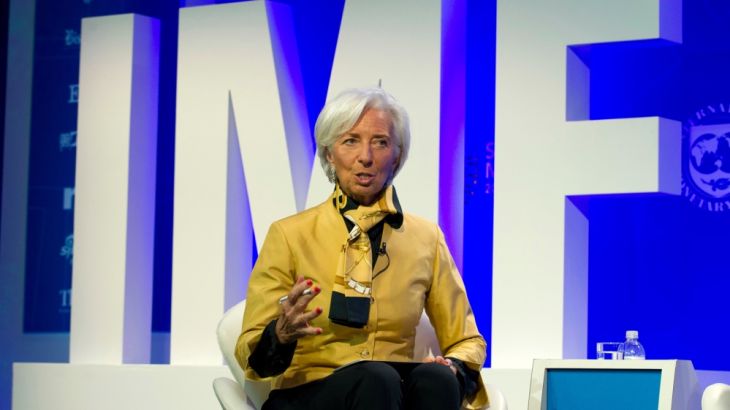
Trade wars and debt: The biggest risks to world economy
What’s behind the IMF’s and the World Bank’s warnings about a looming global economic downturn?
A trade war and a new Cold War are threatening to rip apart the global economy. That’s the springtime message from the International Monetary Fund (IMF) and the World Bank.
Bankers and finance ministers from the IMF’s 189 member countries met in Washington, DC, on the 10th anniversary of the global financial crisis.
Keep reading
list of 4 itemsWhy are nations racing to buy weapons?
Parallel economy: How Russia is defying the West’s boycott
US House approves aid package worth billions for Ukraine, Israel
And although optimistic about economic growth over the next couple of years, the IMF warns that aging populations, lacklustre productivity, rising debt and the possibility of a global trade war could lead to a downturn.
“While the sun is shining, we are seeing more clouds accumulating on the horizon than we did back in October. Global debt is at an all-time high,” said Christine Lagarde, the IMF’s managing director.
According to the IMF, global debt came in at $164 trillion in 2016, an historic peak.
The IMF bails out failing economies and tries to create financial stability, while the World Bank lends to poor and middle-income countries.
Together, these two United Nations institutions aim to raise global living standards. But there’s danger ahead, even if the world economy is projected to grow by 3.6 percent in 2018.
Assessing the IMF’s report card, it provided a “fairly positive picture,” says Gregor Irwin, chief economist at Global Counsel. “Global prospects are good, one or two clouds on the horizon, concerns about protectionism, concerns about financial vulnerabilities in China.”
”They
are not in a trade war yet, but there’s a risk of a trade war … it would be fair to describe US policy as unpredictable and also quite aggressive.”]
Irwin believes China’s rising debt, as well as a looming trade war between China and the US, could pose a threat to the global economy.
“Growth prospects remain good in China, nobody’s expecting a major slowdown tomorrow in Chinese growth, but the big concern about China is that debt to GDP is still rising. It’s projected to rise further still, and it’s very high by the standards of other countries or by historical standards, and frankly, it looks unsustainable. So that is a genuine concern over the next few years over the stability of the global economy.”
Irwin says that the US and China “are not in a trade war yet, but there’s a risk of a trade war. One of the concerns about a trade war is it wouldn’t just involve the US and China, but it would inevitably drag in other countries as well and they’d be caught up in the crossfire between the US and China. Right now, I think it would be fair to describe US policy as unpredictable and also quite aggressive. Equally, I think when you look at China’s policy stands – also what the Europeans might do if there are any measures targeting China, I think we can expect to see retaliation, and that’s where the trade war scenario really begins to potentially become a real one.”
Also on this episode of Counting the Cost:
Cuba’s post-Castro era: Cuba‘s president Raul Castro has passed on the baton to his chosen successor, Miguel Diaz Canel. The change comes at a time of growing economic uncertainty for the Caribbean island’s 11 million people. President Canel has some tough challenges ahead, as Latin America editor Lucia Newman reports from Havana.
Saudi Arabia oil: Reports say Saudi Arabia would like to see oil prices at $80-100 a barrel. The kingdom needs $83 a barrel to balance the budget. And it wants to give a boost to its oil giant, Aramco, before a widely anticipated IPO. A deal between Saudi Arabia and Russia to limit global oil supply to 1.8 million barrels a day has worked. The world is no longer drowning in oil. But the fear among other producers is that higher oil prices will throw off the delicate balance of supply and demand and drive up US shale production.
China censorship: A public outcry in China forced its most popular social media network to reverse a decision to ban gay content online. Sina Weibo, China’s equivalent of Twitter, received a backlash when it blocked videos and comics referring to homosexuality. The gay community is cautiously welcoming the development, as Adrian Brown reports from Beijing.
Netflix: Netflix added 7.4 million more subscribers between January and March this year – the fastest growth in its history. Those quarterly results helped shares hit an all-time high on Wednesday. Because Netflix does not use advertising, it doesn’t have the same issues over data privacy as other streaming video providers. Facebook and Google insist on being called technology companies.That’s despite depending on ad revenue business models. But Netflix, because it spends big on original content, is happy to be called a media company. Reports say it now wants to buy movie theatres.
Ethiopia rubbish: Africa’s first plant that converts waste to energy is close to coming online in Ethiopia.
It’s been built next to a landfill site, as Stefanie Dekker reports in Addis Ababa.
Jordan electric car: A German company is investing in charging stations for electric cars across Jordan. And since the country doesn’t produce oil, there’s good reason to move away from fuel-burning cars, as Natasha Ghoneim reports from Amman.